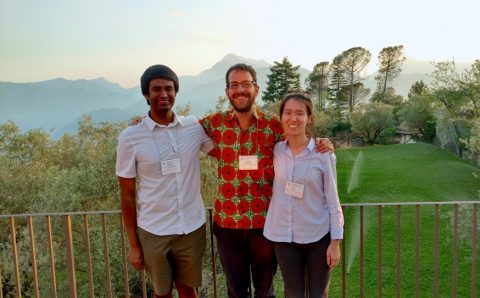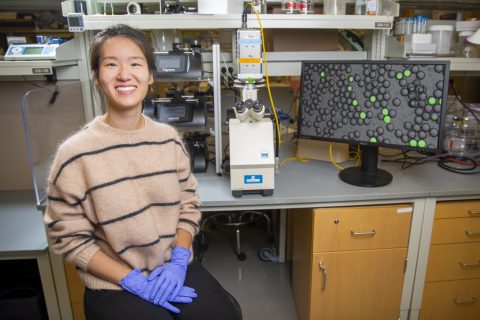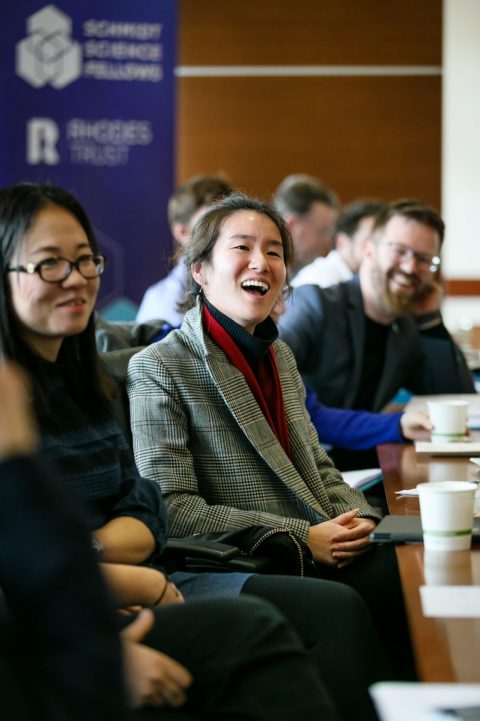
Working across disciplines is vital for science to help to solve the world’s big problems. It is the central premise of Schmidt Science Fellows – but the practicalities of what this means for an individual can be difficult. Schmidt Science Fellows identifies emerging science leaders who have the drive and character to take on this challenge and surrounds them with a support network that helps them to achieve their ambitions.
Dr Jina Ko, a 2018 Schmidt Science Fellow, trained as a bioengineer but then shifted disciplines to work in chemistry and molecular biology. As she says herself: “This is very difficult because you are no longer building on top of your five years of work in your PhD, you’re starting from the very beginning. Being a Fellow made the transition easier and enabled me to begin my pivot as part of a supportive community of like-minded and ambitious scientists.”
Jina wants to improve diagnostics for cancer and other diseases to better match therapies to patient needs. She recognized earlier in her training that this would demand broad skills and expertise and she set herself the goal of being a scientist who could build bridges between disciplines.
Jina spoke to us about her personal and professional ambitions and her interdisciplinary pivot.
Q: Who inspires you?
A: My inspiration has built gradually from working in different disciplines and delving deeper into science. I’m still on my journey but if I had to pick individuals who stand out as inspirational figures for me, it would be my current and past advisors, Ralph Weissleder at MGH and David Issadore at UPenn. Ralph’s ability to identify real medical problems and translate technologies for clinical use has always been inspirational, which helps me to imagine the power of the technologies I build. Dave’s unique approaches to building tools that stem from his physics background have been fascinating to me, which helps me realize how fun science can be.

Q: Why did you apply to the Schmidt Science Fellows program?
A: My PhD was multidisciplinary, I worked mostly in bioengineering but used a lot of machine learning and bioinformatics to analyze data that I collected using the tools I developed. Working with different people from different fields came with many advantages and so with my postdoc I wanted to do something very different. I wanted to be someone who has knowledge of two different languages in one field, to then merge them in a complementary way. The Schmidt Science Fellows program and mission does exactly that, transcending disciplines and providing a disciplinary pivot to foster interdisciplinary science.

Q: How did the Fellowship shape your ambitions for the future?
A: My ambition is built around my end goal. There are a lot of scientists carrying out different types of research – some are purely curious about new scientific discoveries whilst others want to develop tools that can be used by doctors to benefit patients. I want to take my science further than the lab and published papers. I want my tools to be used in the world to help people – and that really drives my ambition.
I have always been very ambitious as a person. This is one of my driving factors why I changed my research from the engineering of microfluidics at the University of Pennsylvania, to explore effective diagnostic technology during my placement year as a Schmidt Science Fellow at Massachusetts General Hospital. This shift in disciplines itself is very difficult because you are no longer building on top of your five years of work in your PhD, you’re starting from the very beginning. Being a Fellow made the transition easier and enabled me to begin my pivot as part of a supportive community of like-minded and ambitious scientists.
Q: In what way did the Fellowship change your perspective?
A: The Fellowship opened my eyes to a bigger picture. When you focus on one strand of research for five years, you tend to forget your focus, but my placement year presented me with the opportunity to explore interests I did not know I had which have contributed towards a clear path for my future. I wanted to go deeper into developing molecular tools not knowing too much about chemistry. However, working in a lab surrounded by chemists helped me into realizing I had an interest there and I’m now working on a project with a chemistry focus. That experience would not be possible without my Fellowship.
I always thought I will become a professor, but what kind of professor? During my Fellowship I was able to find a niche combination which I can use to run a future research program as a professor and give back the skills and unique insights I have gained. So, you can say I am on a particular path now that is a strand of the bigger picture journey.

Q: How has the Fellowship helped to pave the work you are currently doing?
A: Working with Ralph Weissleder gave me insights into solutions that are helpful to the real world and into how to deploy engineering tools into clinics.
Together with colleagues, we are trying to look for small, nano-sized particles in the blood that have the potential to monitor cancer therapy , and we want to focus on novel immunotherapy – a new cancer therapy that uses your immune system to help fight cancer more effectively. As it is new therapy there is currently no diagnostics that can guide the therapy at this point, the therapy is extremely expensive and time consuming so we would not necessarily want to put patients through the therapy stage. Instead we want to develop diagnostics that can monitor a patient’s immune system during the therapy so we can find a way to make it more effective and therefore guide patients knowing some will respond better than others.
Born in Seoul, South Korea, Jina attended Korean Minjok Leadership Academy high school, which had a US-based curriculum that prepared Jina for studies overseas. She continued her studies by double majoring in French Studies and Bioengineering from Rice University in Houston, before studying for her PhD in bioengineering at the University of Pennsylvania.
Jina’s Schmidt Science Fellows postdoctoral placement was hosted by Massachusetts General Hospital and Harvard Medical School in Boston. She is now consolidating her interdisciplinary pivot with a Schmidt Science Fellows Additional Study Grant during 2019-20.
This article and film is part of the We Are Schmidt Science Fellows series, providing an insight into the science, motivations, and stories our of Fellows – watch the series here.